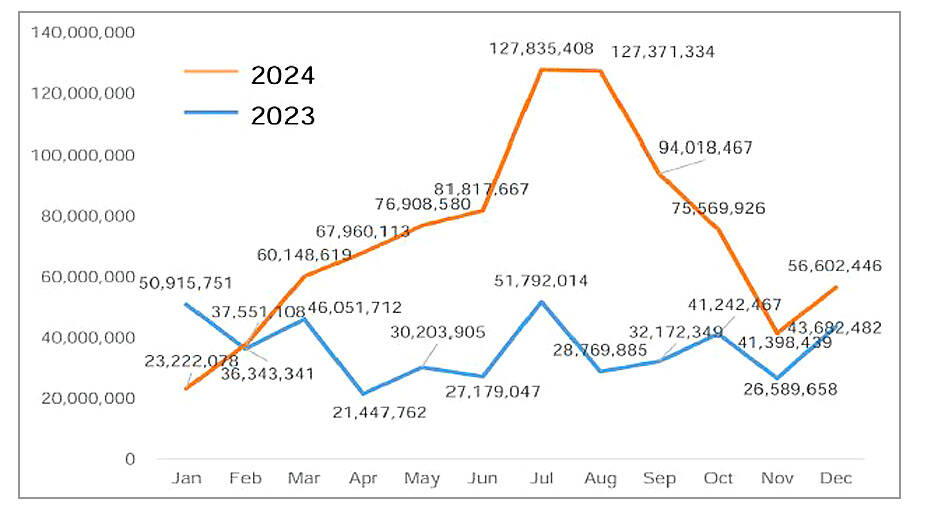Taiwan faced twice as many cyberattacks per day last year compared with the previous year, with the majority attributed to Chinese cyberforces, the National Security Bureau (NSB) said in its latest report.
The government service network registered a daily average of 2.4 million cyberattacks last year, compared with 1.2 million in 2023, according to the report titled “Analysis on China’s Cyberattack Techniques in 2024.”
While most of these attacks were effectively intercepted, the overall situation highlights the increasing severity of cyberattacks, it said.

Photo: Reuters
In the face of the continuous attacks, data theft and disruptions by Chinese cyberforces, the report helps the public understand trends and threats in cybersecurity, it said.
There were 906 cases of cyberattacks targeting the government and private sector last year, an increase of 20 percent from 2023, the agency said.
Government agencies accounted for 80 percent of these cases, it added.

Photo courtesy of the National Security Bureau
There was a 650 percent increase in attacks targeting the communications sector, 70 percent increase in the transportation sector and 57 percent increase in the defense supply chain, the report said.
These sectors have become the key focus for Chinese cyberoperations, which target vulnerabilities in government networks to steal information, the agency said.
Chinese cyberforces last year employed eight primary strategies in targeting Taiwanese entities, it said.
First, they targeted government agencies using “living off the land” techniques to avoid detection and social engineering attacks on public officials’ e-mail accounts, it said.
Second, they used various methods to infiltrate and steal information from Taiwan’s defense supply chain and information service providers, it said.
Third, they targeted critical infrastructure, such as highways and ports, aiming to disrupt the nation’s transportation systems, it said.
Techniques used to accomplish this include advanced persistent threats, phishing e-mails, zero-day vulnerabilities, Trojan viruses and backdoor programs, it added.
Fourth, they collaborated with civilian hacker organizations, employing ransomware and other cybercrime tactics to attack Taiwan’s manufacturing companies for economic benefit, it said.
Fifth, they concealed traces of cyberattacks and stole Taiwanese citizens’ personal data to sell on the dark Web, the agency said.
Simultaneously, they criticized Taiwan’s cybersecurity defenses on social media, undermining national credibility and morale, it added.
Sixth, they combined military exercises with cyberattacks, launching distributed denial-of-service attacks against Taiwan’s transportation and financial institutions to intensify disruption, it said.
Seventh, they targeted high-tech start-ups worldwide to steal patented technologies and gain a competitive advantage, it said.
Lastly, they are building a global stealth cyberattack network, exploiting password vulnerabilities to take control of Taiwan’s Internet of Things devices and make them carry out cyberattacks, it said.
China continues to escalate its cyberoffensives against Taiwan, employing diverse hacking techniques to conduct reconnaissance, plant traps, and steal data from government agencies, critical infrastructure and key private enterprises, it said.
The government leverages a joint cybersecurity defense mechanism and uses multiple intelligence sources to promptly warn responsible departments of any threats, the agency said.
The public should also prioritize cybersecurity measures and remain vigilant against Chinese cyberthreats, working together to safeguard the nation’s overall network security, it added.

AIR SUPPORT: The Ministry of National Defense thanked the US for the delivery, adding that it was an indicator of the White House’s commitment to the Taiwan Relations Act Deputy Minister of National Defense Po Horng-huei (柏鴻輝) and Representative to the US Alexander Yui on Friday attended a delivery ceremony for the first of Taiwan’s long-awaited 66 F-16C/D Block 70 jets at a Lockheed Martin Corp factory in Greenville, South Carolina. “We are so proud to be the global home of the F-16 and to support Taiwan’s air defense capabilities,” US Representative William Timmons wrote on X, alongside a photograph of Taiwanese and US officials at the event. The F-16C/D Block 70 jets Taiwan ordered have the same capabilities as aircraft that had been upgraded to F-16Vs. The batch of Lockheed Martin

GRIDLOCK: The National Fire Agency’s Special Search and Rescue team is on standby to travel to the countries to help out with the rescue effort A powerful earthquake rocked Myanmar and neighboring Thailand yesterday, killing at least three people in Bangkok and burying dozens when a high-rise building under construction collapsed. Footage shared on social media from Myanmar’s second-largest city showed widespread destruction, raising fears that many were trapped under the rubble or killed. The magnitude 7.7 earthquake, with an epicenter near Mandalay in Myanmar, struck at midday and was followed by a strong magnitude 6.4 aftershock. The extent of death, injury and destruction — especially in Myanmar, which is embroiled in a civil war and where information is tightly controlled at the best of times —

Taiwan was ranked the fourth-safest country in the world with a score of 82.9, trailing only Andorra, the United Arab Emirates and Qatar in Numbeo’s Safety Index by Country report. Taiwan’s score improved by 0.1 points compared with last year’s mid-year report, which had Taiwan fourth with a score of 82.8. However, both scores were lower than in last year’s first review, when Taiwan scored 83.3, and are a long way from when Taiwan was named the second-safest country in the world in 2021, scoring 84.8. Taiwan ranked higher than Singapore in ninth with a score of 77.4 and Japan in 10th with

China's military today said it began joint army, navy and rocket force exercises around Taiwan to "serve as a stern warning and powerful deterrent against Taiwanese independence," calling President William Lai (賴清德) a "parasite." The exercises come after Lai called Beijing a "foreign hostile force" last month. More than 10 Chinese military ships approached close to Taiwan's 24 nautical mile (44.4km) contiguous zone this morning and Taiwan sent its own warships to respond, two senior Taiwanese officials said. Taiwan has not yet detected any live fire by the Chinese military so far, one of the officials said. The drills took place after US Secretary